Japanese and Korean have a lot in common, from word structure to grammar, and the many uses of homophones in their languages make these two languages very identical to each other.
Furthermore, many say that Koreans only need about 6 months or less to become fluent in Japanese because of these similarities.
Then, the number of foreign students and Korean workers building careers and lives is not small. The numbers are also very large to compete with the number of foreigners from China. The number of JLPT test takers from South Korea is also very large every year.
In most Japanese language schools in several major cities such as Tokyo, Osaka, Kobe and some other cities in Japan, we often meet foreign students from Korea studying Japanese. Japanese can be said to be one of the most popular languages for foreigners from South Korea to learn.
However, in the midst of the current pandemic situation, it is not easy to find the latest and most reliable information about the JLPT exam being held in South Korea. Therefore, to help JLPT candidates in South Korea understand more comprehensive and in-depth information about the administration of the JLPT exam, we present this article for you.
Everything you need to know about how the JLPT exam is conducted in South Korea, the registration process, the fees to be paid, and where to go if you have any problems is summarized here. Let’s start the discussion about the JLPT in South Korea!
Contents
1. About JLPT (Japanese Language Proficiency Test)
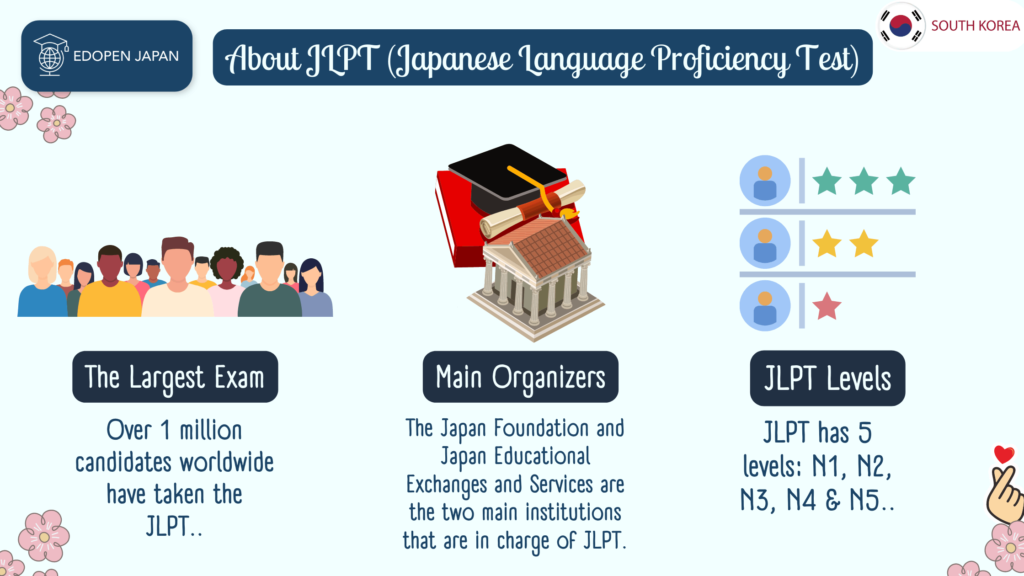
Japanese culture lovers are really familiar with the word JLPT. Including college students and students who are about to graduate and plan to build a career in Japan. Okay, so what’s the JLPT test actually? JLPT stands for the Japanese Language Proficiency Test. This test is a measure and certification requirement of Japanese language proficiency for those whose native language is not Japanese.[1]
In addition, the exam is administered by two main institutions: the Japan Foundation and the Japan Educational Exchanges and Services.[2] Both work together to organize JLPT exams in Japan and abroad. Specifically, overseas, the JLPY exam is organized by the Japan Foundation in cooperation with official local institutions that have been recognized.
This exam has been in existence since 1984.[3] To date, more than 1 million candidates worldwide have taken the JLPT.[3] Therefore, this exam can be said to be a Japanese language proficiency test with the largest scale and reach worldwide compared to other Japanese language proficiency exams.
To date, the JLPT continues to develop and expand to various regions around the world in order to reach and provide the widest possible opportunity for everyone to learn Japanese and take the JLPT exam.
In particular, the JLPT exam is very special and has a unique character. There are 5 levels that the JLPT offers to the test takers in order to evaluate their skills as accurately as possible when taking the test. The 5 levels of the JLPT exam: N1, N2, N3, N4, and N5.[4] N1 is the most difficult and prestigious level of the JLPT while N5 is the easiest level.[4] Each level also has its own scoring component that is very accurate in evaluating the skills of the candidate.
The Advantages of Taking the JLPT
There are many benefits to having a JLPT certificate at a certain level. JLPT certificates offer a wide range of benefits, from academic credit and graduation certification in schools to hiring preference in the workplace and recognition in the community. Let’s take a look at some of them:
- For job opportunities. You can look for jobs in Japan, from teaching English to working in some Japanese companies. Most jobs require at least N2 proficiency.
- Promotion and salary increase. The better your Japanese language skills and proven by JLPT certificates, you will be able to get better salaries and be trusted in more strategic work positions.
- For self-assessment. JLPT is a great assessment to personally monitor and test your Japanese level, and you can travel to Japan later without any language problems.
- Get special points at immigration. You will receive points and be included in the group of people who have special skills, so you will get various easier immigration processes.
- For admission to Japan’s top universities. If you want to study at a top Japanese university, the N2 certificate is the minimum requirement for enrollment.
Not only that, but you can get so many wide opportunities by taking and having JLPT certificates. Once you master Japanese, then you can also look for scholarships, and many other part-time job opportunities to get side income as well as to build your career in many sectors.
2. About JLPT in South Korea
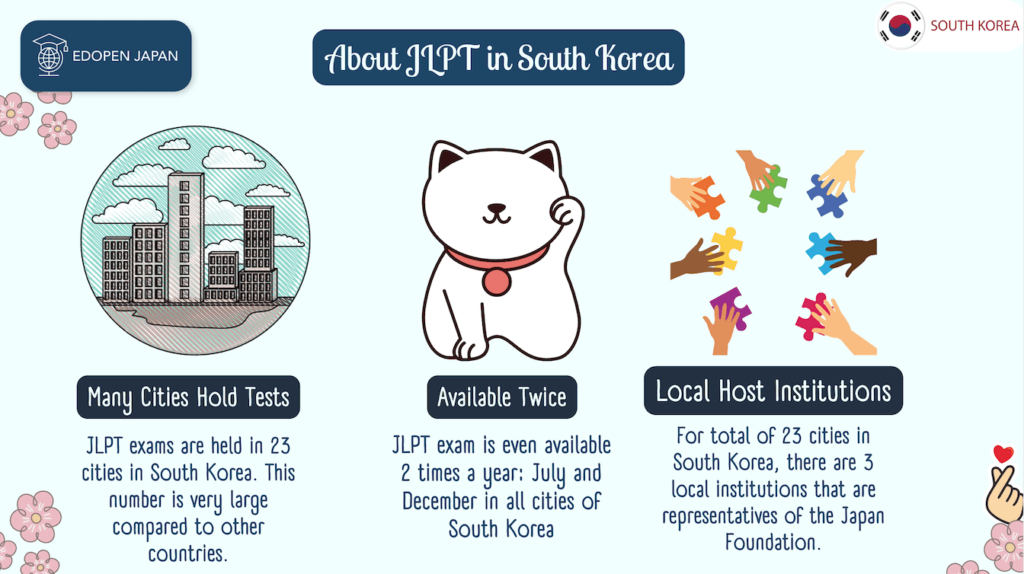
JLPT exams are held in 23 cities in South Korea. This number is very large compared to other countries. For those of you who want to take the JLPT exam in South Korea, it is very important to know in which cities the JLPT exam is available. Furthermore, the JLPT exam is even available 2 times a year: July and December in all cities of South Korea. You just have to choose the closest or most convenient city for you to take the JLPT exam.
In addition, each city on the same island has 1 local institution that is the center for administering the JLPT exam on behalf of the Japan Foundation. For a total of 23 cities in South Korea, there are 3 local institutions that are representatives of the Japan Foundation.
For further information regarding the administration of the JLPT exam in South Korea, please refer to the information available on the website of the local institution. A list of local institutions administering the JLPT exam in South Korea is provided in the next section. For information on official local institutions administering the JLPT exam in South Korea and other countries that are officially registered by the Japan Foundation, please visit the following website!
List of Local Host Institutions in South Korea
The following is a list of local institutions that administer the JLPT exam in South Korea. You must select a city and know the local institution. If you have any problems registering for the JLPT exam later, you can contact this local institution for further assistance!
| City | Host Institution |
| 1. Seoul, Incheon, Suwon, Seongnam, Anyang, Cheonan, Cheongju, Daejeon, Jeonju, Gwangju, Chuncheon, Goyang, Bucheon, Wonju | Japanese-Language Proficiency Test Administration Commitee, Seoul |
| 2. Busan, Gimhae, Daegu, Gumi, Changwon, Jinju, Ulsan, Pohang | Busan Korea-Japan Cultural Exchange Association |
| 3. Jeju | The Jeju Chamber of Commerce & Industry |
All the latest information regarding the administration of the JLPT exam in each city in Korea can be found on the website of the local institution. Please refer to their website for all information.
3. General Info about JLPT in South Korea
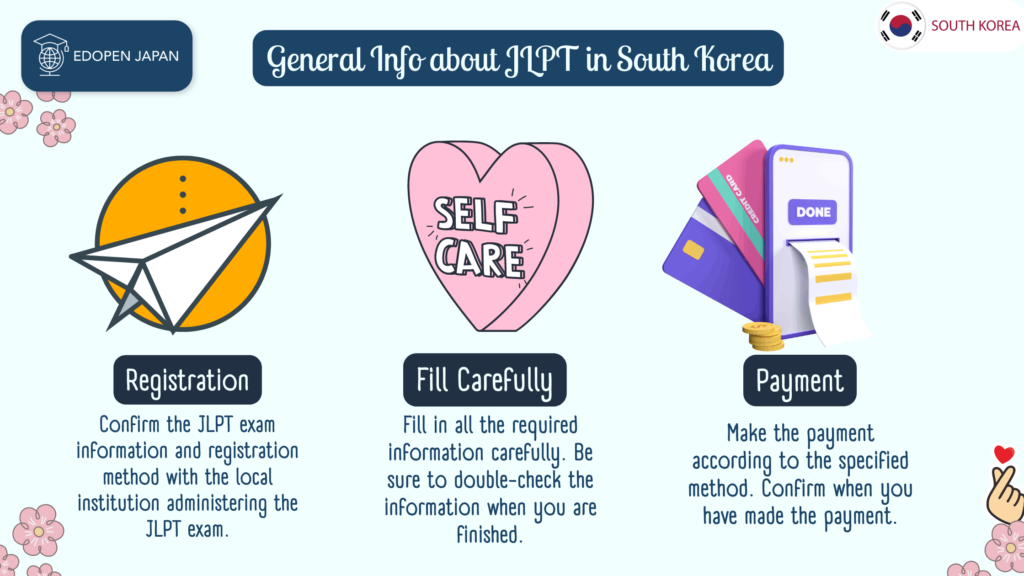
The following is general information about the timeline for the steps and the process for administering the JLPT exam in South Korea. The standard for implementing the JLPT exam is almost the same compared to other countries. It’s just that the application period usually varies depending on the policy of the local institution.
Below is a timeline of the JLPT exam implementation process in South Korea that you can use as a reference. However, for more detailed information, please refer to the information available on the local institution’s website.
- Confirm the JLPT exam information and registration method with the local institution administering the JLPT exam.
- Make sure to access the test guide, which usually includes the application form, carefully before filling out the form.
- Confirm the JLPT exam application period on the institution’s website. There is usually a quota limit in each city. You need to register quickly to secure your seat.
- Fill in all the required information carefully. Be sure to double-check the information when you are finished. The address and level of the test are very important. Avoid mistakes when filling in the required information.
- Make the payment according to the specified method. Confirm when you have made the payment.
If you have done all the steps correctly, you will receive a confirmation email that your registration has been recorded. If you don’t receive a confirmation email or payment, please ask the local institution to follow up!
Test Guide and Fee
The test guide is usually available on the local institution’s website when the registration period is open. Please refer to the information listed on the website. If you would like to read the previous Test Booklet as a reference for the upcoming JLPT exam, you can contact the local institution to request this Test Guide file.
For reference, the following is the fee for the JLPT exam in South Korea that you will need to prepare for.
| JLPT Level | Fee |
| 1. N1 | ₩ 60,000 (Regular Reception) ₩ 66,000 (Additional Reception) |
| 2. N2 | ₩ 60,000 (Regular Reception) ₩ 66,000 (Additional Reception) |
| 3. N3 | ₩ 60,000 (Regular Reception) ₩ 66,000 (Additional Reception) |
| 4. N4 | ₩ 45,000 (Regular Reception) ₩ 49,500 (Additional Reception) |
| 5. N5 | ₩ 45,000 (Regular Reception) ₩ 49,500 (Additional Reception) |
Please refer to the information posted on your local institution’s website for any fee changes. If you have any questions or problems paying for the JLPT exam, please contact your local institution.
4. How to Register for the JLPT Exam in South Korea?
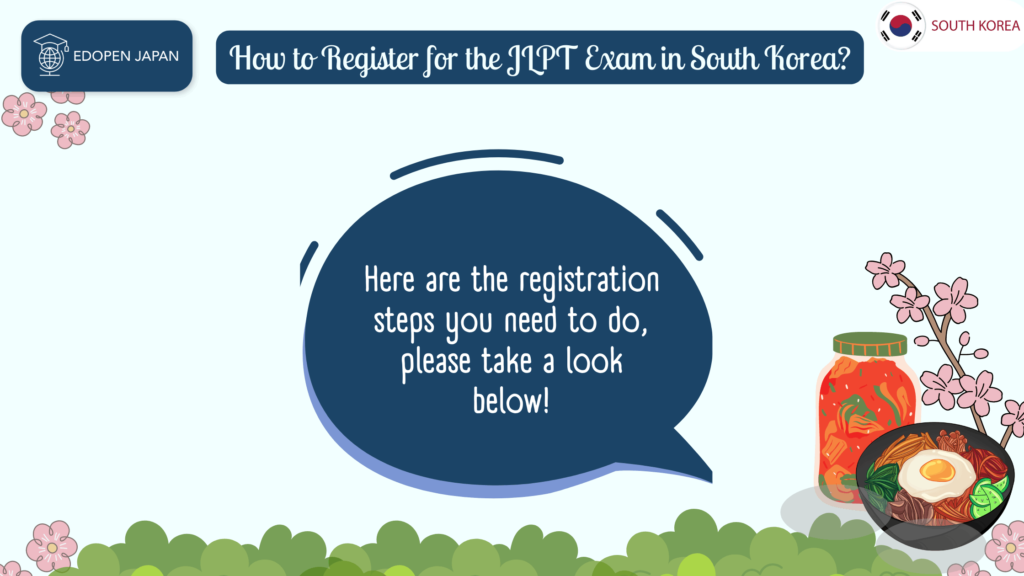
To take the JLPT exam in South Korea, the thing you need to pay close attention to is the method or procedure for registering. The following are the registration steps you need to take. You can use it as an illustration. You should always follow the instructions listed on the local institution’s website, as some steps may change.
- For online application, you can apply it via PC or mobile application available. The application will be available for 24-hour operation within the application period.
- For mail application, please download and fill in the application form from the form data area on the main home page, attach the application form, a passport photo (3cm×4cm), and the examination fee (certificate for postal redemption), and send it by registered mail to the address of the host institution to which you are applying.
- After filling in the info and finishing your registration, you need to print the exam ticket or voucher.
- Be sure to always fill in the information carefully and correctly. Please double-check the information you entered during registration.
- Make payments according to the methods and instructions provided.
Then follow the other steps in the Test Guide and the information available on your local institution’s website. Be sure to contact your local institution if you have any problems registering and paying for the JLPT exam.
The Important Notes for Candidates with Special Needs
The JLPT Japanese Language Proficiency Test Organizing Committee provides “exam accommodations” for people with physical disabilities. As well as for candidates who have health problems or other limitations.
If JLPT test candidates wish to request anything for the smooth running of the JLPT test, candidates may contact the local host institution where they are taking the test. Please make sure to contact the host institution before the registration period closes.
Also, as the policy of each host institution is different, it is expected to carefully read and monitor the development of the latest information, which is always will be updated on the website of the host institution.
5. How to Prepare for the JLPT Exam in South Korea?
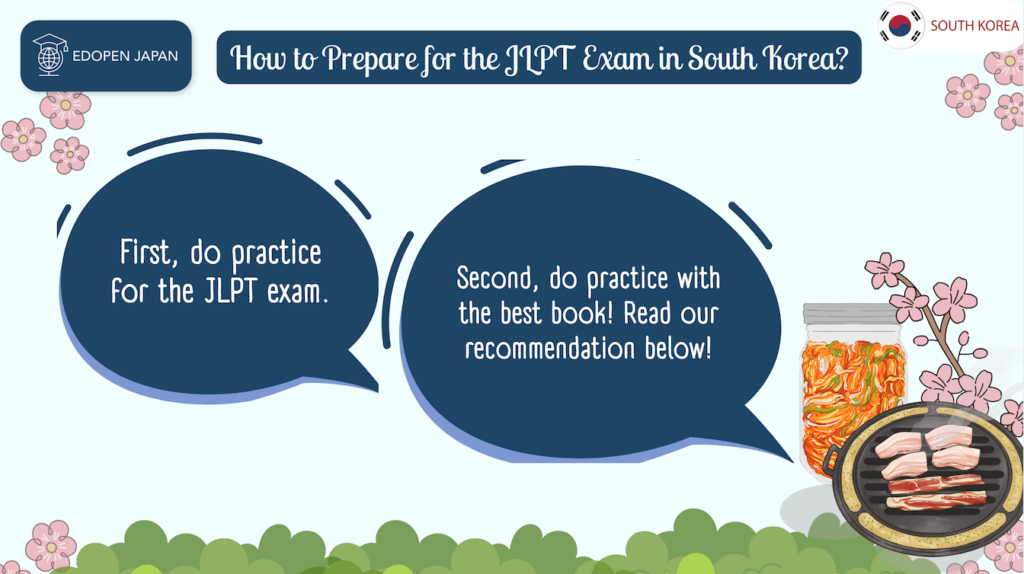
How did you prepare for the JLPT exam in South Korea? Are you ready to take the JLPT exam in July or December? To strengthen your JLPT exam preparation in South Korea, we would like to recommend the following.
First, practice JLPT exam questions according to your desired level. The more you can practice JLPT exam questions, the higher your chances of getting a high score. Also, the more comfortable you are with the questions, the faster you can take the JLPT. If you are currently struggling to pass the JLPT N1 exam, please read the recommended JLPT N1 practice book below.
Second and very important, the special vocabulary exercises that come out in the JLPT exam are also very important and essential for you to do. The more vocabulary you master, the greater the chance that you will be able to answer the exam questions correctly. For your reference, please read the vocabulary recommendations for the JLPT Level N1 exam below.
Is there a point we missed? Please let us know in the comments section below.
Conclusion
This is the end of the detailed information about the JLPT test in South Korea. Sometimes changes happen very quickly, especially in the middle of Covid 19. Participants are expected to maintain good health and follow health protocols in order to take this JLPT test. Also, remember to always check the local host institution’s website for the latest information!
Hopefully, this article will help you prepare for the JLPT test in Korea. Stay enthusiastic and believe that if you prepare well for this JLPT test, good or even perfect results will be yours. See you in our next article. We wish you good luck!
References
1 “Objectives“. The Official JLPT Website. Retrieved 28 April 2023.
2 “The Organizers“. The Official JLPT Website. Retrieved 28 April 2023.
3 “Message from Organizers“. The Official JLPT Website. Retrieved 28 April 2023.
4 “N1-N5: Summary of Linguistic Competence Required for Each Level“. The Official JLPT Website. Retrieved 28 April 2023.













